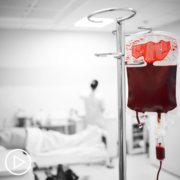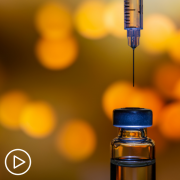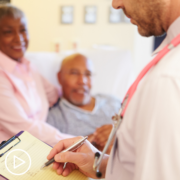Which Myeloma Patients Are Candidates for CAR T-Cell Therapy?
Which Myeloma Patients Are Candidates for CAR T-Cell Therapy? from Patient Empowerment Network on Vimeo.
Myeloma specialist Dr. Omar Nadeem discusses which patients are most appropriate for CAR T-cell therapy and explains cytokine release syndrome (CRS), which may arise following this treatment approach.
Dr. Omar Nadeem is the Clinical Director of the Myeloma Immune Effector Cell Therapy Program and Associate Director of the Multiple Myeloma Clinical Research Program at the Dana-Farber Cancer Institute. Learn more about Dr. Nadeem.
Related Programs:
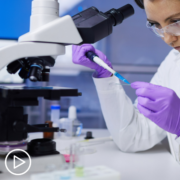
|

|
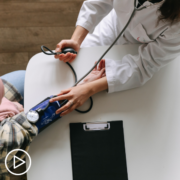
|
Transcript:
Katherine Banwell:
“How is it determined as to which patients might be the best candidates for clinical trial CAR T-cell treatment?”
Dr. Omar Nadeem:
So, CAR T-cell therapy is already approved. It’s FDA-approved for patients that have had four or more prior lines of myeloma therapy. So, when we think about a patient coming to us for that particular treatment that have relapsed myeloma, we’re always looking to see how much of the previous therapy they had.
Whether they meet the indication, the labeled indication for that particular product. And then now, as we’ve discussed today, we’re studying this CAR T-cell therapy in various different phases of myeloma. Earlier lines of therapy, even thinking about studying it in high-risk smoldering myeloma, right? And then kind of looking about how we can best study this therapy in so many different phases.
So, it all depends on where a patient is in their disease state, and then we kind of look to see whether a commercial approved CAR-T product makes sense for them, or we think about one of our several relapse CAR T-cell trials that are looking at BCMA target, which is what the approved one is, but also looking at newer targets like GPRC5D that we’ve brought up before.
So, it encompasses a lot of different things, that question, but I think in terms of the candidacy of the patient itself, we do know that these CAR T-cell therapies have some toxicity, so we have to then weigh in terms of what medical problems they have whether they’ll be able to tolerate what the majority of patients with CAR T-cell therapy get, which is this syndrome called cytokine release syndrome, where patients will get a fever.
And in some cases have changes in their blood pressure or oxygen levels. We have to make sure that the patient’s body can handle that. I will say we’ve gotten better and better at managing a lot of toxicities as it comes to CAR T-cell therapy. When this was first approved, it was all pretty new, but now what we’re learning is if patients are developing a fever, which the majority do, we’re intervening earlier and earlier to prevent them from getting sicker.
So, these are things we’ve learned now, and the majority of patients get through CAR T-cell therapy toxicity period much better than they did when it was first approved.

